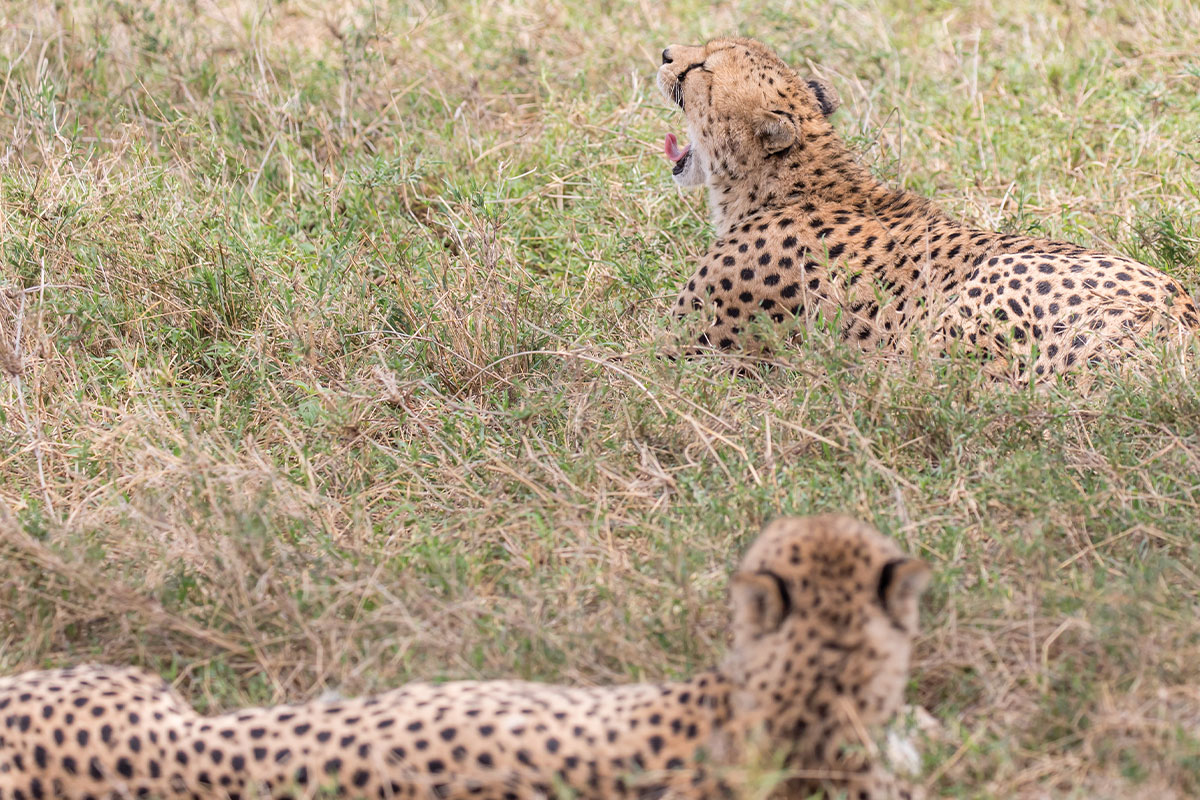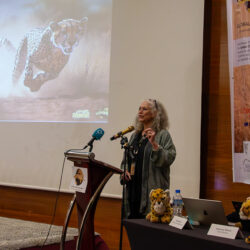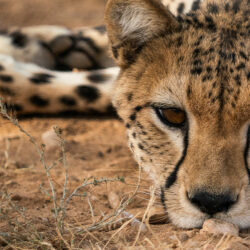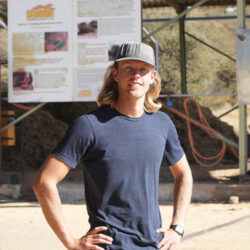Support Our Progress – Double Your Gift TODAY
-
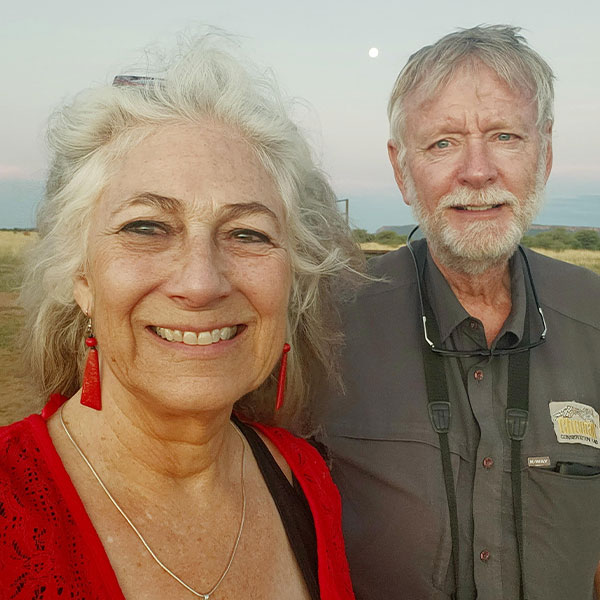
- by Dr. Laurie Marker November 16, 2021

At the beginning of this year we set some resolutions for the organization, things we wanted to achieve in 2021. The biggest challenge we faced from the previous year was staying safely connected to rural communities during the pandemic. We were also concerned with maintaining a meaningful connection to YOU. It is so important for us to bring you updates on the work Cheetah Conservation Fund (CCF) field researchers, scientists, and teachers are doing to save the cheetah across its range.
Below are just a few of our 2021 resolutions that we achieved.
Build and bolster rangewide environmental education
Teams of educators and researchers at CCF, rangewide partner NGOs and Universities are bringing forth the research that informs the world on the current state of the cheetah population and the overall health of its ecosystem. So far this year we’ve had eight research papers published in scientific peer-reviewed journals and there are more in the editing stage or awaiting their final approval and about to be published.
Deliver Livestock Guarding Dogs to new farmers and expand our involvement with farm visits in the Eastern Communal Lands in Namibia
COVID has taken its toll on the rural farming population and still poses challenges for outreach, but this year our farm visits continued in Eastern Communal Lands. CCF also participated in the Okamatapati Agriculture Show, the first Farmers’ show that this settlement has ever hosted. Farmers from the Okakarara Communal Conservancies were provided information on integrated livestock management and conservation, human-wildlife conflict mitigation tools and bush encroachment management using BUSHBLOK® as a model. We had two litters of Livestock Guarding Dogs this year with three more litters on the way in November and December.
Develop and raise awareness for biomass energy production
To help make wide-spread biomass energy production and usage a reality in Namibia, CCF studies new techniques for gathering and processing overgrown thickened thornbush into higher yield fuel sources. From our Biomass Technology Demonstration Centre at CCF’s Namibian headquarters, we will begin studying a new production process known as torrefaction with a grant from the European Union. It is a relatively new process and could improve the physical properties, chemical composition, and energy and storage properties of biomass.
Expand Future Farmers of Africa & Future Conservationists of Africa participation into new areas of cheetah rangeland like Somaliland and Ethiopia
CCF has been fortunate to have the help of several skilled veterinarians working tours of duty in our Somaliland Cheetah Safe Houses. This year, veterinarian Dr. Iman Memarian, began teaching weekly classes in wildlife medicine for students at the Gollis University Veterinary School. To expand our Future Conservationists initiative CCF is building a support system for young professionals that are interested in learning more about wildlife conservation in the regions. Dr. Ahmed Yuusuf, CCF’s local veterinarian and educator, started a WhatsApp group for students to receive information pre-and-post class.
Conduct surveys and outreach campaigns in Somaliland to increase awareness of the negative impacts of the illegal pet/wildlife trade
To gain a better understanding of the unique needs in Somaliland, we conducted a series of surveys with two-hundred and fifteen elders and village leaders (both men and women). We asked how they are coexisting with wildlife, specifically predators like cheetahs, and other information about their livestock and livelihoods. Participants were asked about how they coexist with wildlife, specifically predators like cheetahs, and other information about their livestock and livelihoods. This will help lead our Future Farmer of Africa and Future Conservationists of Africa programs in the region in 2022.
Work with pastoral/nomads in the Horn of Africa to reduce livestock predation and human-wildlife conflict
From the information we collected in surveys of pastoralists in Somaliland and Ethiopia we will develop educational materials that will help to address their specific human-wildlife conflict concerns. While collecting our surveys we conducted several educational outreach programs and answered questions about predator-friendly livestock protection, rangeland management issues, and sharing about stewardship of the wildlife in the region.
Please help us continue our progress into 2022 by making a donation during our Home Range for the Holidays Campaign. All donations made before midnight December 31st will be doubled, up to $325,000. All the things we are able to achieve are due to your support. We hope you will continue to join us in our important mission to save the cheetah in the wild.
Education is so critical to our mission success that we have an International Research and Education Centre in Namibia that is open to the public 364 days per year and features an outdoor learning centre with overnight campgrounds and an outdoor kitchen for large school groups.
Research informs our programs at every level. CCF is the only conservation organization in Africa with its own on-site genetics laboratory. We hold a Genome Resource Bank for the cheetah and curate samples from across the species range.
Community engagement has been a part of CCF’s strategy from day one. We conduct surveys in the community and work directly with farmers and pastoralists experiencing livestock loss from predators. In Namibia, we operate a full-scale Model Farm where we breed Livestock Guarding Dogs for rural farmers to guard their herds in a predator-friendly way.
Livelihood development helps the communities living alongside the cheetah. In Namibia, we operate the Dancing Goat Creamery and Cheetah Cafe where we offer training opportunities for young people to learn how to make delicious goat milk products including (my favorite) Amarula flavored ice cream, artisan cheeses, fudge and soap.
Habitat restoration creates more usable land for wildlife and livestock. CCF’s ecology team works to selectively clear the landscape of thickened thorn bush. CCF is Forest Stewardship Council (FSC®) Certified and we are proud to work within these high standards in certification to study the effects of landscape changes on the soil and create low emissions fuel logs called BUSHBLOK® from the thornbush that’s harvested.
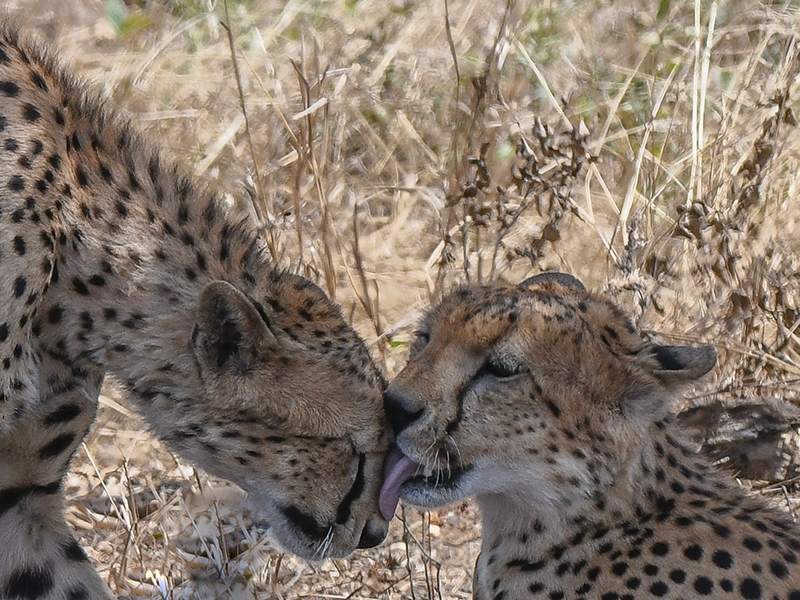
CCF’S 2021 Year-End Challengers
Anonymous | Frank & Elaine H. Besson | Brooks H. Browne | James Clark, DVM | Candice Clough | Jenny Cordina | Sally F. Davidson | Barbara Nolan & Henrly Eimstad | Bert & Candee Forbes | Nathan Foster | Ken Heroy | James A. Poley & Joyce Kaneshiro | Richard & Darcy Kopcho | Beth Leonard | George S. Loening | Elizabeth Marquart | Sara R. Nichols | Linda Pauer | JP & Caitlin | Pollack | Marci Rubin | Gary Rygmyr | Adina L. Savin | James & Katherine O. Snowden | Dr. Roswitha Kima Smale | James & Magalen Webert | Angela C. Weisskopf | Berman Family Philanthropic Fund | Bruce G. Geary Foundation | Chantecaille | Concierge Unlimited International | Dante Stephensen Trust | Dr. Martine J. Work, FHREE | Lehr Family Charitable Fund | Margery Nicolson Trust | MyUS | Polly Horton Hix Foundation
Photo by Chris Kosseff
Related Reading
-
February 7, 2024
Dr. Laurie Marker’s Opening Speech at the Global Cheetah Summit -
November 15, 2023
Double Your Gift – Home Range for the Holidays 2023

